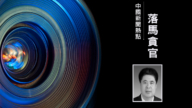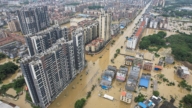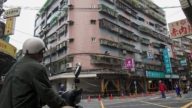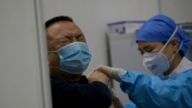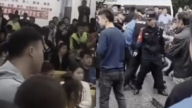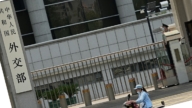【新唐人2014年07月10日讯】中共新闻出版广电总局日前出台新规,禁止新闻从业人员不得向其他境内外媒体和网站,提供相关职务信息等。评论分析,出台这个新规,是限制新闻从业人员报导那些中共内部应该让公众知道,却隐瞒不报的丑闻。
7月8号,大陆媒体刊登《新闻从业人员职务行为信息管理办法》内容,《管理办法》要求各新闻单位与所属的新闻从业人员,必须签订保密承诺书、和职务行为信息保密协议。
新规定禁止新闻从业人员向其他境内外媒体、或网站提供所谓的“职务行为信息”﹔还禁止通过博客、微博、微信等公众账号、或个人账号,以及论坛、讲座等任何场所,透露和发布“职务行为信息”。
新规认定,新闻从业人员在从事采访、参加会议、听取传达、阅读文件等职务活动中,获取的各类信息、素材以及所采制的新闻作品,其中包含的国家秘密、商业秘密、和未公开披露的信息等,都属于“职务行为信息”。
原《河北人民广播电台》编辑朱欣欣表示,这些规定是中共几十年来对新闻媒体人一贯采取的作法,只不过现在被正式摆上了台面。
原《河北人民广播电台》编辑朱欣欣:“实际上中共搞这个法规,就是为了限制记者泄露它们内部的这些丑闻,内部一些它们试图隐瞒的,该让公众知道的,但是它却隐瞒不报的,不让大家知道的这样的信息,实际上它是找这个借口,什么都成了国家机密了,在中国,不应当是机密的它也是列为机密。”
今年5月初,中国资深女记者高瑜,被中共当局以涉嫌触犯“境外非法提供国家秘密罪”刑事拘留。中共喉舌报导说,高瑜去年8月,将一份中共的所谓“机密文件”提供给境外网站刊登,引发多家网站转载。
中共所指称的这份文件,是去年5月,中共下达各级官员及高等院校学习的“七不讲”禁令。
前《中国民营》杂志记者刘逸明:“从新闻自由的角度讲,记者、媒体人没有保密的义务,所谓的国家机密应该是属于保密人员它不应该向记者和媒体透露的,所以说即使记者和媒体所报导的新闻涉及到国家机密,我觉得这个责任也不在记者和媒体,而在于真正的国家的工作人员。”
朱欣欣认为,哪些信息是属于国家机密,必须保密的范围﹖中共应该制定相关法规,制定好后由保密人员去执行。
朱欣欣:“你不需要让公众知道的话,你就可以保密,你封锁这些信息,你就可以不接待记者的采访,首先在你这儿应该是把住这个关,你不能说你的信息你泄露了,你埋怨记者,你等于说把这个责任推给记者。”
刘逸明表示,现在中国媒体生存空间越来越狭窄,什么是国家机密又没一个标准,所谓的“职务行为信息”也语焉不详,这样很容易造成媒体人被当局以泄密为由整肃。
刘逸明:“很多记者也都很清楚,在中国是,欲加之罪,何患无辞,即使很多记者所报导的内容不是真正的国家机密,但是因为对对方不利,所以有可能会因此而被警方以泄密为由进行抓捕。”
6月18号,中共国家新闻出版广电总局发布通告,禁止记者擅自作批评报导。美国中文杂志《北京之春》主编胡平指出,目前中国的传统媒体和网路媒体多达上万家,中共对真正的泄密者根本无能为力。
美国中文杂志《北京之春》主编胡平:“海外很多媒体整天在登这些小道消息,就是被你官方所禁止的消息,哪些消息从哪来的呢?包括当局它不可能完全不知道,但是它就是无可奈何,因为他们派别,党内权力斗争本身各自出于他们自己的政治需要,实际上也不断在违犯他们自己的规定。”
胡平表示,如今互联网普及,各种信息多如牛毛,即使当局出台再严格的规定,也无法完全屏蔽个人发布信息的渠道。
采访/朱智善 编辑/李韵 后制/陈建铭
Secret or scandal?
The State Administration of Press, Publication, Radio, Film
and Television of the People’s Republic of China (SAPPRFT)
ban reporter leaking
The SAPPRFT has released new regulations to prohibit
journalists providing duty related information to domestic or
foreign medias and websites.
It’s commented the new regulation is to restrict the Chinese
Communist Party (CCP) inner scandals that should be known
by the public.
July 8, mainland media published the content of the
journalists’ duty behavior and information management.
It requires all media and journalists to sign a
confidentiality and job behavior information agreement.
The new regulations prohibit journalists providing the
so-called official information to other domestic or
foreign media and websites.
It also prohibited releasing official information through
public or personal account in blog, microblog, WeChat, as well
as forums, seminars or any other places.
The new regulations believe all information and materials, as
well as the news works including state secrets, commercial
secrets and undisclosed information, etc.
are official information.
This includes job activities
such as interviews, meetings, the conveying and
documents as well.
The former Hebei People’s Radio editor Zhu Xinxin said that
these are the consistent approach to the journalist from CCP for
decades, just they are on the table now.
Zhu Xinxin: 302 The CCP’s regulation is to restrict the
reporters to release internal scandals which they are trying
to hide but should be public.
They are trying to find an excuse to make everything a state
secret, even it’s not confidential.
In early May, senior female reporter Gao Yu, was detained by
the Chinese authorities on suspicion of illegally providing
state secrets to overseas.
The CCP mouthpiece said last August, Gao Yu provided a
so-called confidential document to overseas websites which
made many websites reprinted.
The confidential document was the prohibition of seven things
not allowed to be said, issued by the CCP to all levels of
officials and institutions of high learning.
Former Chinese private magazine reporter Liu Yiming: From the perspective of freedom of press, reporters and media people
have no obligation on the confidentiality.
The so-called state secrets shouldn’t be released by
the confidential person.
So even the news is related to state secrets, the
responsibility is not on the reporters and the media,
but the real national staff.
Zhu Xinxin thinks that the CCP should formulate the law and
regulations on the scope of state secrets.
The confidential person will execute it later.
Zhu Xinxin: You can keep the secret and block the information
without letting the public know.
You should hold the pass first not to release the information
and accept the interview.
It’s equal to shifting the responsibility onto the reporters
when you blame the reporters after having released
information on them.
Liu Yiming said that the Chinese media living space has
become increasingly narrow now.
There is no standard for state secrets.
The so-called official information is not detailed.
It is easy for authorities to purge media people with
the excuse of leaking information.
Liu Yiming: Many reporters know that a staff is quickly
found to beat a dog in China.
Even though the information is not a state secret,
the reporters are still easy to arrest with the excuse of
leaking as long as the information is detrimental to the CCP.
June 18, the SAPPRFT issued a ban to prohibit the
reporters’ unauthorized comments.
US Chinese magazine Beijing Spring chief editor Hu Ping
pointed out that the CCP can do nothing to the true leaker
because China traditional media and online media are up in
the tens of thousands.
Hu Ping: overseas media posted lots of banned rumors often.
Where did they get the information?
The authorities shouldn’t be completely unaware of where
they get it.
However, they can do nothing, because their faction struggle,
inner Party power struggle stem from their own needs, which
make them violate their rules constantly.
Hu Ping said the Internet is very popular offering plenty and
a variety information.
Even though the authorities have issued stricter rules, they
cannot completely shield channels
for personal publishing of information.
Interview/Zhu Zhishan Edit/Li Yun Post-Production/Chen Jianming


